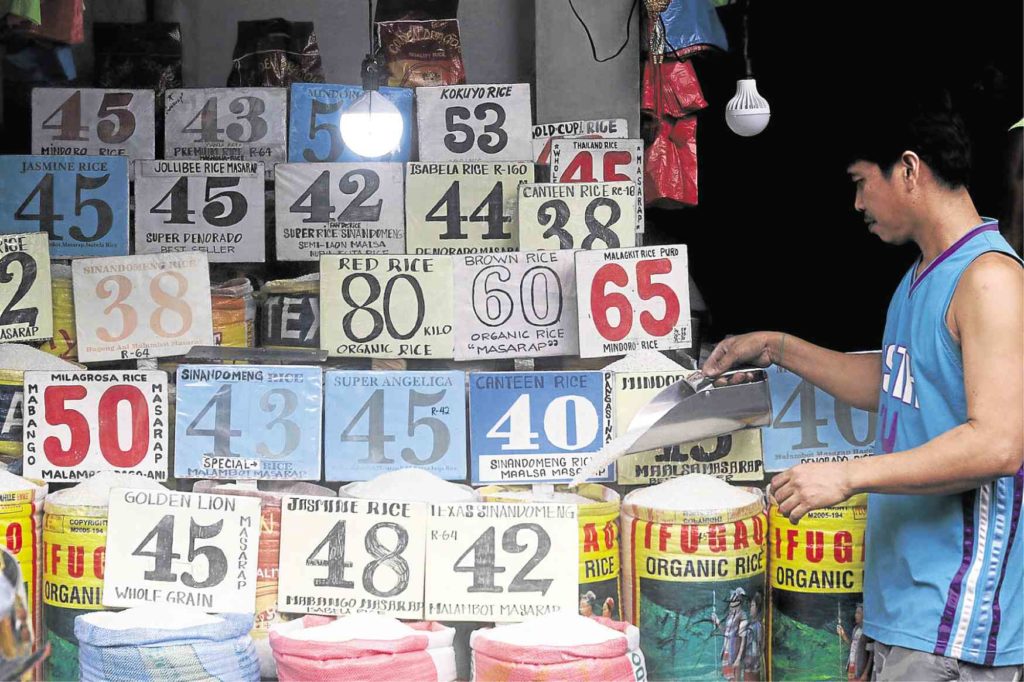Inflation spoils 6.8% growth in Q1

HIGH PRICES While the government has reported a 6.8-percent economic growth in the first quarter, lawmakers are calling for a suspension of its tax reform law that triggered rising prices, including that of rice, on the poor. —FILE PHOTO
High consumer prices weighed down Philippine economic growth in the first quarter to 6.8 percent, or below government’s full-year target, the country’s chief economist said on Thursday.
While the country remained among the fastest-growing economies in the region, the gross domestic product (GDP) could have expanded by nearly 7.5 percent year-on-year had inflation not risen beyond the target, according to Socioeconomic Planning Secretary Ernesto M. Pernia.
“So inflation is the spoiler,” Pernia said at a press conference.
The first-quarter GDP growth was nevertheless slightly higher than the 6.4 percent posted in the same period last year. GDP is the value of goods produced and services rendered in a given period.
Filipinos have identified curbing inflation and raising wages as their top concerns, according to a recent nationwide survey.
In the first quarter, the inflation rate averaged 3.8 percent before it rose to a five-year high of 4.5 percent in April, bringing the four-month average to 4.1 percent or beyond the government’s target of 2 to 4 percent.
TRAIN law, oil prices
The Tax Reform for Acceleration and Inclusion (TRAIN) Act, coupled with a weaker peso and rising global oil prices, has been blamed for the faster inflation rate.
The law, implemented on Jan. 1, jacked up or slapped new excise taxes on cigarettes, sugary drinks, oil products and vehicles, among other goods, to compensate for the restructured personal income tax regime that raised the tax-exempt cap to an annual salary of P250,000.
Lawmakers have called for the suspension of the TRAIN law to cushion the impact of rising prices on the poor.
Sen. Bam Aquino filed on Thursday a bill seeking the automatic suspension of the excise tax on fuel under the TRAIN law should the average inflation rate for a three-month period exceed the annual target set by the government.
“It is our responsibility to be flexible and responsive when the weight of inflation becomes too heavy for the poor Filipino families to bear,” Aquino said.
Economic managers had expected consumer spending to pick up due to the TRAIN law, which granted workers more take-home pay under the new tax rates.
Consumption slows
But Pernia explained that “higher inflation tends to deter or soften demand for goods that are experiencing price increases.”
Household consumption growth in the first quarter slowed to 5.6 percent from 5.9 percent a year ago and 6.2 percent in the previous quarter, according to the Philippine Statistics Authority (PSA).
Johdel Ocampo, 30, a business development consultant for a multinational IT company, enjoys a relatively high pay but laments that lately, high prices were affecting his family’s purchases.
“Grocery expenses now reach P1,500 to P2,000 just to complete our list of necessary items for the week. Our gas consumption of P900 to P1,000 per week became P1,200 to P1,400,’’ Ocampo told the Inquirer.
“So, when we sum them all up, less money go to our savings and more to our spending,” he added.
Delay in P200 subsidy
It did not help that the mitigating measures for poor families affected by TRAIN met some delays, Pernia said.
“The unconditional cash transfers were just distributed recently and also the Pantawid Pasada has not yet been disbursed,” Pernia said.
He was referring to the P200 given monthly to poor households and to the subsidy to public utility vehicles affected by higher fuel costs, respectively, both provided for under the TRAIN law.
For this year, some 10 million families were supposed to receive the monthly P200 subsidy to mitigate the impact of TRAIN.
So far, only 4 million households have received the subsidy. The remaining 6 million will get the unconditional cash transfer in September.
Sen. Sherwin Gatchalian said he was considering pushing for a higher subsidy of P450 to help families cope with the rising prices.
Second to Vietnam
In the first quarter, the Philippines’ GDP growth was outpaced only by Vietnam’s 7.4 percent and matched by China’s 6.8 percent.
The output of the agriculture sector grew 1.5 percent, contributing 0.1 percentage point to the GDP growth.
Industry rose 7.9 percent, accounting for 2.7 percentage points of the GDP expansion, while services was up 7 percent, contributing 4 percentage points.
For Budget Secretary Benjamin E. Diokno, the Duterte administration’s infrastructure program helped sustain robust economic growth at the start of the year.
PSA data showed that government consumption rose to 13.6 percent in the first quarter from 12.2 percent a year ago.
Finance Secretary Carlos G. Dominguez III said the country was on its way to achieving its targets for high growth and financial inclusion for the rest of the Duterte presidency.
Dominguez said the government enjoyed enough fiscal space to further accelerate spending on its core programs—infrastructure and human capital development—aimed at keeping the Philippines’ status as one of Asia’s fastest-growing economies. — WITH A REPORT FROM LEILA B. SALAVERRIA














